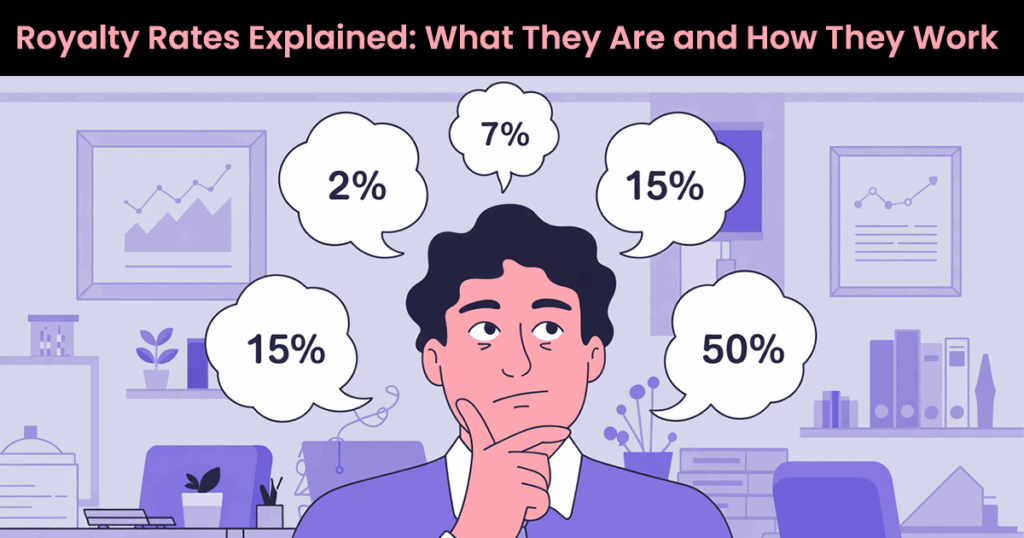No Results Found
The page you requested could not be found. Try refining your search, or use the navigation above to locate the post.
The page you requested could not be found. Try refining your search, or use the navigation above to locate the post.
Whether you are negotiating a publishing contract, licensing a patented product, or distributing digital education content, royalty rates play a central role. This guide explains the fundamentals and industry norms around royalties, so you know what to expect in negotiations and royalty agreements.
Companies managing variable royalty rates across multiple agreements find that MetaComet’s Royalty Tracker® automates all complex percentage calculations and tiered rate structures easily.

Royalty rates are agreed-upon percentage amounts used to calculate a share of sales paid to the owner of a piece of intellectual property (or IP). The owner may be an author, illustrator, inventor, course creator, developer, institution, or other, and is called the “licensor.”
The “licensee” is a business that has negotiated permission to monetize the IP in exchange for a revenue share, or royalties, paid to the licensor. Examples of licensees include book publishers, biotech companies, online learning companies, universities, and many other types of media and technology companies.
The licensee agrees to pay the licensor a percentage of the revenue generated by the licensed product or content. For instance, if a contract specifies a 7% royalty rate on net sales of a product, then the licensor earns $0.07 for every $1 of product sold. These calculations can be based on gross sales, net sales after discounts, or other measures defined in the agreement. (In some deals, royalties are flat fees per unit, but percentage-of-sales is far more common.) Book publishing contracts often base royalties on the book’s cover (list) price.
Intellectual property can range from patents and trademarks to copyrighted content, but the royalty concept is the same: the IP owner earns a share of sales as compensation for use of their asset. This structure allows licensors to share in the upside if the product succeeds, while tying payments to actual performance. Moreover, license contracts normally require periodic royalty statements including sales details, and licensors usually reserve audit rights to verify those reports. Late or underreported payments may incur penalties.
Royalty norms depend heavily on industry conventions, product type, and distribution model. Below we look at three industries to illustrate typical ranges.
Book Publishing
In traditional book publishing, royalty rates depend on format. Generally, hardcover books earn their authors rates of about 10-15% of the cover price, and paperbacks around 5-10%. Digital formats yield higher royalties – e-books and audiobooks typically pay around 25-50% of the list price. For example, if a novel retails at $20 with a 7.5% paperback royalty, the author earns $1.50 per copy. (Some hybrid publishing deals offer much higher royalty percentages, in the range of 50-90% while requiring a larger risk investment from the author.) Authors should remember that publishers often calculate royalties on net sales after returns or discounts, which can reduce the effective rate if retail prices are cut. For instance, deeply discounted or remaindered books may earn the same percentage but on a lower base price.
Biotechnology
Biotech and pharmaceutical license deals usually have much smaller royalty percentages, reflecting long development times and high R&D costs. In these industries, royalty rates are typically in the low single digits. Only blockbuster or special-case products command much higher rates. Biotech deals often include significant upfront and milestone payments in addition to the royalty.
Online Learning
On commercial online education and e-learning platforms, instructors or content providers commonly receive rates on the order of 30–50% of course sales or subscription revenue. For example, Udemy typically pays instructors about 50% of course revenue (up to 97% if the student enrolls via the instructor’s referral link). Subscription platforms like Skillshare typically share around 30–50% of revenue with creators.
In the higher education market, compensation standards are evolving, with royalty arrangements for online course creators varying significantly across institutions. In some institutions online course development is treated as work for hire, with no additional compensation for faculty creators. Other institutions offer flat fees or other incentives for course creation. When royalties are in place, they may be based upon enrollment or revenue. Typically, the royalty rates for revenue-based compensation are in the low single digits unless the courses are licensed to other institutions, in which case the rates may be as high as 50%.
Stop managing royalty rates through spreadsheets when factors like IP value, development stage, and scope changes affect your calculations. Our system handles every variable automatically. Transform your accuracy and efficiency. Get your free consultation now.

Across most industries, royalty rates are shaped by a blend of economic, legal, and strategic factors. Here are the key considerations that typically come into play:
While the general principles apply broadly, each industry has its own norms and nuances when it comes to setting royalty rates.
In book publishing, royalty rates are shaped largely by format, sales channel, and author experience. Common factors in publishing agreements include:
Negotiations will also factor in the author’s track record, platform, and the publisher’s marketing commitment.
Royalty rates in biotech are more complex, often part of larger licensing deals involving patents, proprietary compounds, or research tools. These agreements frequently include milestone payments, equity stakes, and royalties:
Deals are often shaped by how early in the R&D process the licensing occurs and whether the licensor retains manufacturing or co-commercialization rights.
In online education, royalty rates are influenced by the type of content and the distribution platform:
Considerations include the uniqueness of the content, the instructor’s following, and whether the platform bundles the course with subscriptions or licenses it à la carte.
Royalty rates are almost always negotiated in a licensing agreement, factoring in the considerations above. The final terms will depend on the value of the IP, the business goals of both parties, and the overall structure of the deal.
Determining royalty rates isn’t a one-size-fits-all process. While there are industry norms and benchmarks, every agreement reflects a unique mix of value, risk, and negotiation. Whether you’re publishing a book, licensing a biotech innovation, or distributing online learning content, understanding the principles behind royalty rate determination is essential for crafting fair, effective, and strategic deals.
But negotiating rates is only half the battle—tracking, calculating, and paying royalties accurately and on time is where the real operational challenge begins.
If you’re responsible for managing royalty payments, MetaComet® can help. Our royalty automation tools eliminate manual calculations, reduce errors, and streamline payments—freeing up your team’s time while increasing accuracy and transparency.
Contact MetaComet® today to learn how our solutions can help you save time, reduce risk, and strengthen your relationships with rights holders.

David Marlin is the President and Co-Founder of MetaComet® Systems, a prominent provider of royalty automation tools. Since founding the company in 2000, David has spearheaded the development of a suite of best-in-class systems that effectively facilitate royalty processes for nearly 200 publishers. David has also served as the chair for The Book Industry Study Group’s Rights Committee and Digital Sales Committee.
Before establishing MetaComet Systems, David served as a technology consultant for renowned publishers, collaborating with notable companies such as Random House, Penguin, HarperCollins, Holtzbrinck, Macmillan, Scholastic, Time Warner, and many others. David holds both an MBA and a BA from Columbia University in New York.
"*" indicates required fields